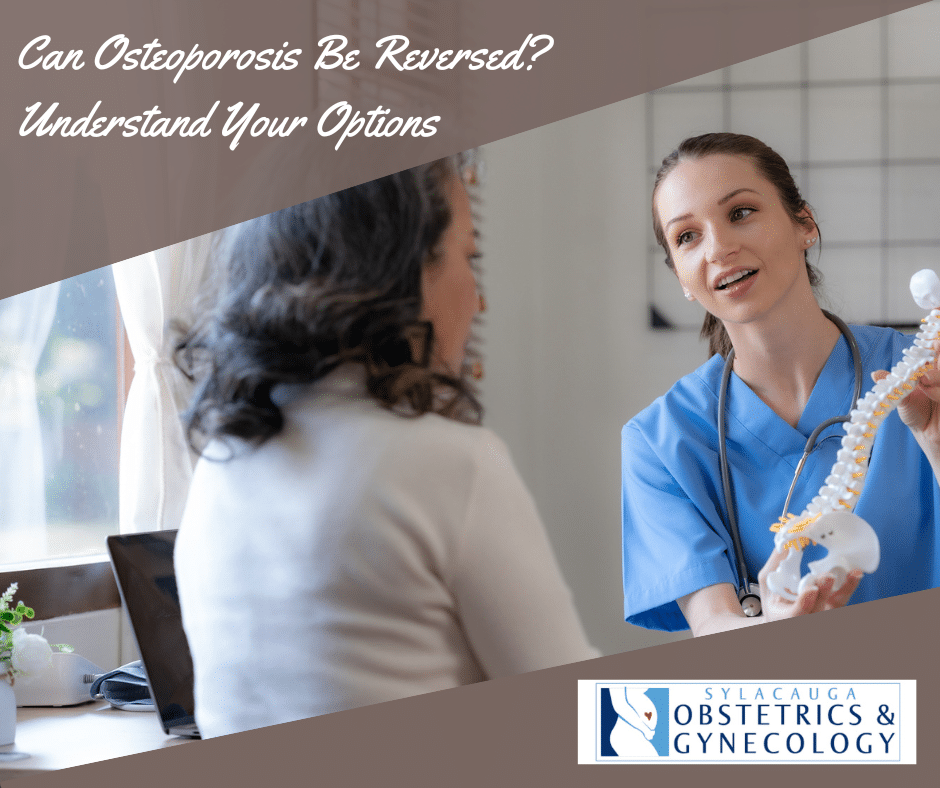
31 May Can Osteoporosis Be Reversed? Understanding Your Options
Osteoporosis is often called a “silent disease” because it can sneak up without obvious warning signs. Many people don’t realize they have it until they break a bone. That’s why staying on top of your bone health matters, especially as you get older.
May is Osteoporosis Awareness Month, so let’s talk about this common yet preventable disease. We’ll cover what osteoporosis is, how to recognize early signs, and what you can do to take better care of your bones.
What Is Osteoporosis?
Osteoporosis is a disease that develops when your bones lose strength and density. Over time, they become thinner and more fragile. This makes bones more likely to break, even during simple activities (like bending over) or a light fall.
Bone loss happens naturally with age, but osteoporosis speeds up the process. Women are especially at risk, particularly after menopause, when hormone changes affect bone health.
Does Osteoporosis Cause Pain?
Osteoporosis itself doesn’t usually cause pain. That’s why many people don’t realize they have it until a fracture happens. Pain often shows up after a bone breaks.
Some common areas where fractures occur include:
- Hips
- Wrists
- Spine
If you start noticing backaches or loss of height over time, it’s worth asking your doctor if osteoporosis testing is right for you. Spine fractures are especially concerning, as they can cause long-term back pain and even lead to a stooped posture.
Signs and Symptoms of Osteoporosis
Even though osteoporosis is often silent, some signs may point to bone loss:
- Getting shorter over the years
- Stooped or hunched posture
- Sudden back pain, especially without a clear injury
- Bones that break more easily than expected
At Sylacauga GYN, we often recommend bone density tests for women over 65 and younger women with high risk factors like early menopause or a family history of osteoporosis.
What Causes Osteoporosis?
Several things can increase your risk:
- Aging: Bone loss speeds up as you get older.
- Hormonal changes: Especially in postmenopausal women.
- Family history: If your parents or siblings had osteoporosis, you’re more likely to develop it.
- Lifestyle factors: Smoking, drinking too much alcohol, and not getting enough calcium or vitamin D can weaken bone tissue.
- Medical conditions: Certain health conditions, like rheumatoid arthritis, or treatments, like long-term steroid use, can affect bone health.
Osteoporosis Self-Care: What You Can Do
While you can’t change your age or family history, there’s a lot you can do to help protect your bones.
Eat a Bone-Healthy Diet
Foods like milk, cheese, yogurt, leafy greens, and fortified foods are packed with calcium, which can help increase bone density.
Make sure you’re also getting enough vitamin D, which helps your body absorb calcium. You can find it in foods like salmon, egg yolks, and fortified cereals. Sometimes, supplements are needed, even in sunny climates like Alabama.
Stay Active
Being physically active is one of the best ways to treat osteoporosis. Weight-bearing exercises like walking, dancing, and light strength training help maintain healthy bones.
Aim for activities that get you moving several times a week. Whether that’s a group exercise program or simply dancing in your kitchen, movement both reduces the risk of falling and of making osteoporosis symptoms worse.
Quit Smoking and Limit Alcohol
Both smoking and heavy alcohol use weaken bones over time.
Fall-Proof Your Home
Falls are a major cause of fractures in people with osteoporosis, so making small changes at home can go a long way.
- Install grab bars in bathrooms
- Keep floors clear of clutter
- Use non-slip mats in tubs and showers
Can Osteoporosis Be Reversed?
Osteoporosis can’t be fully reversed, but it can be managed. Treatment focuses on slowing bone loss, strengthening bones, and preventing fractures.
Your doctor may recommend:
- Prescription medications that help build or maintain bone density
- Calcium and vitamin D supplements
- Physical therapy to improve balance and strength
Starting treatment early helps lower the risk of serious fractures later. That’s why regular checkups and early screenings are important, especially if you have risk factors.
Who Should Get a Bone Density Test?
We usually recommend a bone density test if:
- You are a woman over 65
- You are a younger woman with risk factors like early menopause
- You have already broken a bone from a minor fall
- You have a medical condition or take medications that affect bone health
At Sylacauga GYN, we help women in Sylacauga and nearby towns prevent osteoporosis or manage it safely with personalized screenings and care plans.
Protect Your Bone Health With Help From Sylacauga GYN
If you’re concerned about osteoporosis or want to learn more about protecting your bone health, the team at Sylacauga GYN is ready to help. We offer personalized care for women in Sylacauga and the surrounding areas, helping you take simple steps toward stronger bones and a healthier future. Call Sylacauga GYN at 256-249-6995 today to schedule your appointment and get the support you deserve.


